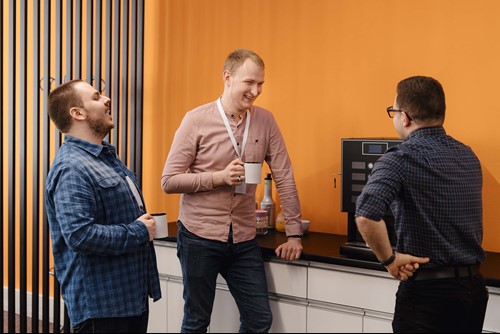We all know personality traits are important, especially in the workplace. Here are 7 personality questions for job interviews to add to your list!
How many of you have tried gauging a candidate’s personality during an interview? How many of you were successful? Better yet, how many of you have said these words: “I really didn’t think he/she was going to be like that when I interviewed him/her!”
Chances are a lot of you have been down that road; thinking you had a candidate’s personality down pat throughout the recruitment process, only to realize once they start that you were way off track.
The good news here is that you’re not alone.
We all know that personality plays a big role in the workplace, but we don’t have the superpower of analyzing personalities at first sight! So here, drawing from the expertise of Atmanco, are some questions for you to add to your interviewing arsenal that will shed a little light onto a candidate’s personality and help assess their culture fit.
7 personality questions to ask your candidates:

1. Tell me about a time when you relied on your technical skills to solve a problem
This question will reveal how adaptable/creative your candidate is. Can they think outside of the box when necessary, or do they get stuck on best practices even when they aren’t working?
Remember, there are some roles where creativity and adaptability are important, and other roles that just don’t really leave much room for innovation. There’s nothing wrong with either, just don’t get hung up on a characteristic that may not be essential for a position.
2. How do you handle stressful situations? For example, when someone interrupts you while you’re in the middle of a challenging task?
Or what do you do when you are faced with an emergency or an unexpected situation?
Again, the sample answers you’re looking for depend on the position you’re interviewing for. If the role requires someone who doesn’t mind being interrupted, loves jumping from one thing to another, and actually enjoys having to spontaneously put out fires, then you’re looking for the ultimate multitasker.
But if the role requires someone who is diligent and organized, then you may not want someone who can easily be distracted.
There are no right or wrong answers to these questions. Just the right person for the right job!
3. Tell me about 2 of your biggest successes, one personal life and one professional life. What was your goal in each case?
What was their motivation behind each one of your successes? This can tell you a lot about a candidate. Even though its primary purpose is to identify what drives and motivates them, you will still be able to learn a lot about who they are.
However, it’s really important to focus on what their motivators are. Are they motivated by:
- results
- competition
- achievements
- ambition
Or are they motivated by:
- stability
- security
- peace of mind
Maybe their drivers are related to team spirit and harmonious work environments.
Each and every one of us has specific motivators that drive our behaviors. But the question you need to be asking yourself is: can the organization/role/leader/etc. provide the right type of motivation for this candidate?
4. Tell me about a time when you disagreed with an action/decision that was taken. What did you do?
Here, you’re looking to identify their level of assertiveness and how they deal with conflict. Do they have an assertive personality style and don’t mind confrontation, or do they prefer to avoid it at any cost? Are they willing to make an unpopular decision for the greater good of the organization, or would they prefer a slightly less optimal solution to avoid making waves? It's important to assess their communication skills, especially in how they manage feedback and dissenting opinions.
Don’t forget that the majority of people fall in the middle of any spectrum, so try to attune yourself to the context that the candidate describes. Are they confrontational and opinionated in every situation, even seemingly mundane ones? Or are they too conciliate, avoiding to take a strong stand even when one is absolutely necessary? This is a critical challenge for many, balancing assertiveness with diplomacy.
Again, don’t forget to consider the role when you analyze the response!
5. Have you ever been surprised by the quality of work someone presented to you? Tell us about it and what you learned.
Personally, I like this question because I find it secretly informative!
It's a subtle way to understand a candidate's ability to evaluate others and their work. The purpose of this question is to see if the candidate is too skeptical, too trusting, or falls somewhere in between. For example, if the candidate says that they were pleasantly surprised by the quality, it indicates their attention to details in a project and their capacity to give an honest answer. Analyzing the context of their response helps gauge their skepticism or inherent trustfulness.
The same can be applied to a candidate who says they were surprisingly disappointed by someone’s quality of work. Does the context in their response imply that they are inherently too trusting? Did they not question the person or process enough, or was the situation an exception? Such insights are crucial in determining if they're the ideal candidate, especially in roles demanding critical evaluation of a current team's performance.
6. Imagine you're at a networking event where you don't know anyone, how does that make you feel?
Would they feel exhausted after the event, or energized?
This question dives into the candidate's soft skills, focusing on social interaction and adaptability. It reveals how their energy levels are influenced by social situations, an important aspect in understanding their potential for growth within the team. Gauging a candidate’s sociability helps assess if they fit the collaborative and daily tasks of the role, and if they are a good match for your team's dynamics.
In other words, people who are more introverted feel like their energy gets drained from being in social settings. Where they have to meet and interact with large groups of strangers, whereas the exact situation would just feed the energy of an extroverted person. And the contrary also applies.
Try to gauge your candidate’s sociability, and determine whether or not it’s a deal-breaker for the role in question. This question can reveal if they are a team player, which is crucial for collaborative environments.
7. What sort of things irritate you the most, which get you down, and what do you do if someone gets on your nerves?
I know, this looks like a 3-in-1 kind of question, but it’s actually all meant to assess (or, at least, try to assess) one thing: emotional maturity.
Here, you're trying to identify their level of patience and tolerance, crucial for maintaining team harmony. Understanding how a candidate controls their emotions provides insight into their technical skills and ability to handle stressful situations, which are often among the common questions in interviews. It’s essential to find someone who can manage their emotions effectively, especially in roles where mentoring and training are key responsibilities.
These personality questions for interviews can prove to be very interesting, but if you do decide to add them to your list of interview questions, there are a few things you need to keep in mind. First, there is no such thing as the perfect personality, so don’t go looking for one! Second, you are looking for the best candidate that will fit the job, team, and culture, not your new best friend.
What’s right for the job and company may not be right for you. And lastly, don’t be afraid to use personality or psychometric tests if you want more insight into a candidate’s personality. Just be sure you’re choosing the right one.
Do you have personality questions for interviews that you would like to share?
Don’t be shy! Use the comments section below to share your experiences and expertise! We'd love to hear your insights and ideas, so join the conversation and enrich our community with your valuable contributions!
